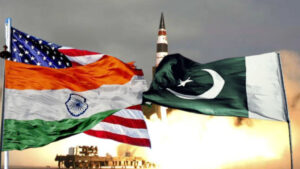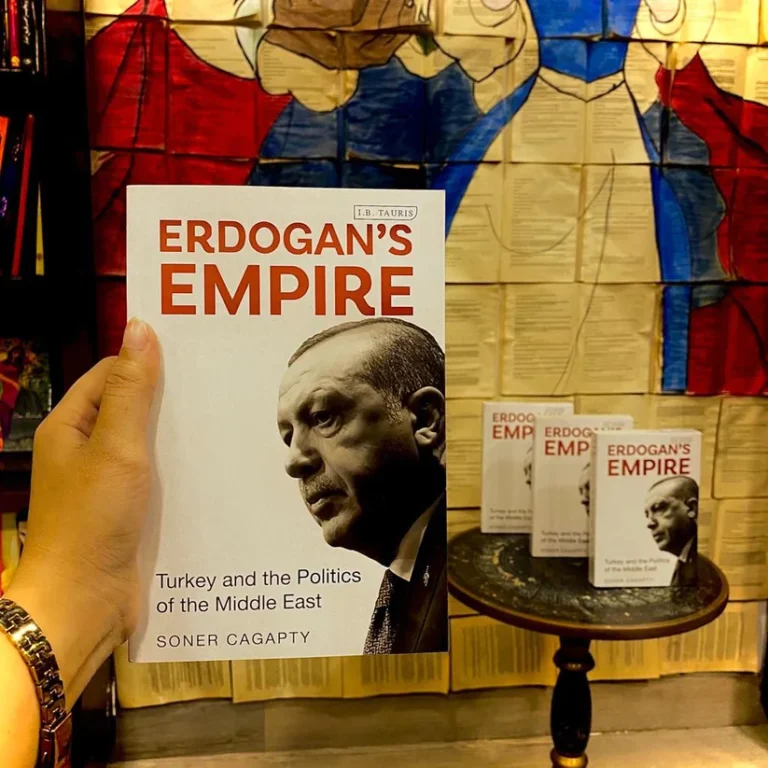By Alishbah Syed
Soner Cagaptay is a Turkish-American political scientist who has written extensively on modern Turkey and is the director of the Turkish Research Programme at the Washington Institute for Near East Policy. He has authored a total of four books on modern Turkey, of which the third will be discussed here. Soner Cagaptay’s book, Erdogan’s Empire: Turkey and the Politics of the Middle East, was published on 19th September 2019 at the Bloomsbury Academic. The author examines the international trajectory and domestic workings of modern Turkey under the leadership of the populist president Recep Tayyip Erdogan and the complex geopolitical contexts that Turkey lives in due to its past and present.
The author attempts to conceptualize modern Turkey under Erdogan as a country attempting to cast its own shadow as a stand-alone power. He extensively describes the pivot away from the West and towards the Middle East with all of the complexities involved in the process.
There are many notable points the author mentioned in the book. He firstly presented a duality of Ataturk and Erdogan being two sides of the same coin with different views but the same methods, essentially being the ‘Anti-Ataturk’. Replace Ataturk’s secularism and ‘Go West’ (a drive to align interests and relations with the West) with political Islam and ‘Go East’ (a drive to align interests and relations with Middle East), you’ll more or less get Erdogan from the use of state institutions and top-to-down social engineering. Additionally, it is the legacy of Ataturk that created Erdogan, it was Ataturk’s drive to justify secularism in the country by re-caricaturing the Ottomans as some crazed radical Islamists that led to a society where Erdogan and his followers were socially excluded due to their religiousness. Erdogan, believing in an image of the Ottomans as pious and God-fearing individuals being defamed (which was also not historically accurate), turned to political Islam and drove to ‘reclaim’ the glory of the Ottomans within and outside Turkey. Then the author went ahead to describe Erdogan’s Turkey foreign policy interaction with other states.
Of the many interesting points present in the book, the mention of Ahmet Davutoglu’s ‘Strategic Depth’ complemented by the ‘Zero Problems with Neighbours’ in the context of Turkey’s foreign policy is noteworthy for any Pakistani with a background in politics. The concept of ‘Strategic Depth’ holds a fascinating duality that manifests differently in Pakistan and Turkey. For Pakistan, the term is defensive in nature. This strategic depth entails a pursuit of buffer zones and fall-back options through Afghanistan in the east due to Pakistan’s long and thin shape putting it at a disadvantage from any Indian invasion from the west. In short, ‘Strategic Depth’ for Pakistan is like a shield.
In contrast, Turkey’s conception of ‘Strategic Depth’ believes in proactiveness and leans towards power projection, through the sentiments of neo-ottomanism by the virtue of Turkey’s unique intersection of different cultural, historical, geographical, and political worlds. This proactive approach seeks to create a zone of friendly states (in line with ‘Zero Problems with Neighbours’ motto) and bolster its position as a regional leader. These different interpretations reflect the unique historical and geopolitical contexts of each nation, revealing the multifaceted nature of the ‘Strategic Depth’ concept on the global stage.
It is this ‘Strategic Depth’ policy of modern Turkey that details the soft power maximization drive that Erdogan had towards his major pivot towards the Middle East and Turkey’s reinvention as a Middle Eastern power and major Islamic symbol. The author showcases how Erdogan attempted to reinvent the greatness that the Ottoman Empire had in its prime by creating multiple alliances in multiple regions and international bodies through the appeal of Turkey-led entertainment programs, humanitarian aid, businesses operating even in conflicts or around sanctions, airlines, schools and religious outreach to present Turkey as a moderate and preferable Islamic role model. These alliances include;
-
- The Middle Eastern countries like Palestine, Iran, Turkey-Qatar axis or Ikhwan group to further Turkey’s influence in the region and play block politics against its competitors like Saudi-UAE axis;
-
- The African countries like Somalia and Sudan and also AU (African Union), to counter the rival Gulen movement, to cash in the economic engagement and strategic locations, and to use the 28% membership of African countries in UN to get UN Security Council member.
-
- The Eurasian countries of the Balkans, Central Asia and Black Sea region for Turkish security concerns and economic engagement.
With the EU and the US, Erdogan found his rise of power and excuse to pivot away from the ‘Strategic West’. With Syria, Turkey found the reality of Erdogan’s rash Middle East pivot with the start of the overblown Kurdish issue. With Russia, Turkey faced a historically feared entity from its past and a daunting ally in its present. With Iran, Turkey faced its historical enemy and present frenemy. It is Erdogan’s pivot away from the ‘Strategic West’ that modern Turkey saw its cultural, historical, geographical, and geopolitical intersections presenting a duality of the lackluster pivot toward the Middle East and enthusiastic pivot toward Africa and Eurasia. Along with the mixed results of Erdogan’s pivot away from the ‘Strategic West’, the author presents the dilemma Erdogan is facing in his attempts to create Turkey a major Middle Eastern power. Erdogan can’t completely tapper Turkey off of the US and the EU. While the US and the EU require Turkey politically, while Turkey requires the US and EU in terms of finance and defence. The author mentioned three scenarios that Turkey is going towards under Erdogan’s leadership which are interlinked to some extent:
-
- Turkey can muddle through as a stand-alone power; successfully hedging the NATO-West, Muslim East, and Russian North blocks against each other to get the leverage it needs for its security and ambitions. This strategic would require Erdogan to maintain balanced relations with the US and Russia.
-
- But the chances of failure are high due to the structural weaknesses in the foreign policy section like rivalry with the Gulen, personalised foreign policy, and Kurdish terrorist outfits in addition to the domestic section like violence against Syrian refugees and potential economic crisis due to international capital losing trust undermining Turkey’s stability. This could lead to Turkey going under the influence of another great power, something Erdogan vehemently doesn’t want.
-
- In order to avoid the second path, Erdogan will have to relink with the ‘Strategic West’ as an Autarchic power. This is because though Erdogan has removed Turkey culturally and political from the West, Erdogan is also aware of the financial and security dependency that Turkey has with the West. So, Turkey will have to relink and maintain relations with the ‘Strategic West’ for the finance, security and clout whilst being a ‘champion’ of the Muslim cause and Global South.
Additionally, the author recommends to address the Kurdish Issue. This issue is a complex entanglement of cultural rights, historical grievances, and political aspirations that has become internationalised, connecting Turkey’s political dynamics with Syria through Kurdish groups like PKK in Turkey and YPG in Syria that share ties with Russia and Assad regime. Turkey should have a call for granting broad cultural rights to all in an attempt to disarm or weaken the PKK and YPG and prevent them for becoming proxy of Russian and Assad regimes or strain US-Turkish ties. The provision of freedom of religion and freedom from religion should be for all. And more importantly, Turkey needs to keep attracting and retaining talent and capital.
There are a total of 18 sections in this book, including the introduction and conclusion. There is the odd complaint of the sectioning and placement of information being repetitive but, in my personal opinion, it works great for finding specific topics you are after and remembering all the points discussed in the book for a better level of comprehension. It is a relatively easy-to-read book with interesting wordings to boot as well, considering it is meant to be a policy-based book rather than establishing any narrative or political opinion. It is highly recommendable for any student of politics to consider reading this book if he or she is interested in having a holistic view of modern Turkey with considerably less bias.
One area where the book could be strengthened is by including a discussion of the Armenian genocide, an event for which modern Turkey is still facing considerable backlash due to the absence of acknowledgment, especially during the time the book was published. In addition, I felt the indirect neo-imperialistic message attached to Erdogan’s leadership of modern Turkey in the book to be misleading. Specifically, it being present in the title of the book, “Erdogan’s Empire”, and on page 301, the author characterizes Turkey’s conduct as reminiscent of that of an ‘imperial nation.’ Contrarily, the author himself disagrees with such claims of Turkey’s neo-imperialistic aspirations when in globalized international system; this action is the norm. Neo-ottomanism being compared to neo-imperialism is an unfair comparison, in my opinion. While both concepts involve projecting power; their motivations, methods, and historical contexts differ. Neo-Ottomanism, with its softer and multilateral engagement, contrasts to the forceful and exploitative nature of neo-imperialism. Neo-ottomanism, to me, seems like more of an ideal for modern Turkey to look up to in terms of having a better diplomatic, political, and economic role in the international community. There seems to be less expansionism and more ambitions to reinvigorate past glory of modern Turkey to make it a stand-alone power.
Overall, the book was a good read. I like learning about subjects in one go and one place, so this book is a must-read for anyone who wishes to understand Turkey within the international system comprehensively with a great degree of integrated information. The points and analysis in the book are captivating and thought-provoking. The choice of words is unique, and sentences are easy to digest. This book is an essential addition to the understanding of any beginner in the area of Turkey’s foreign policy literature.








